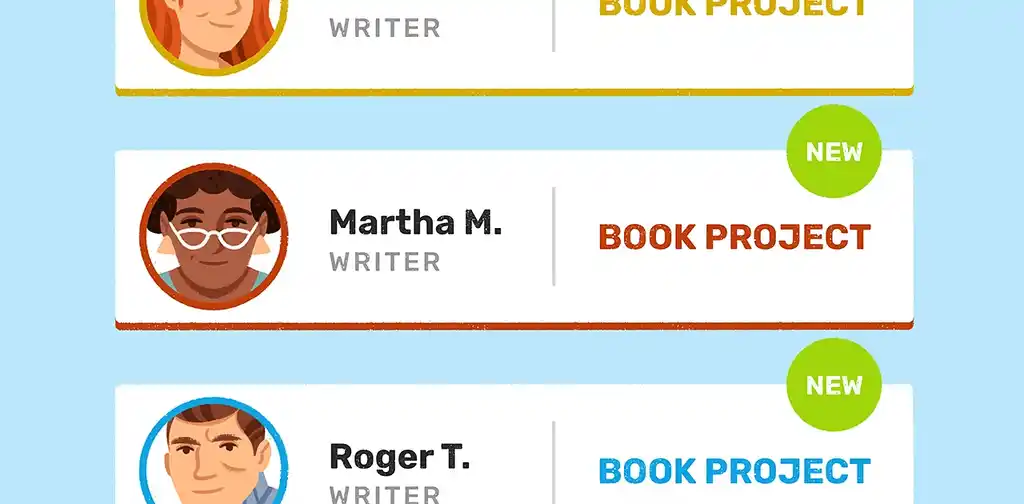Blog •
Last updated on Jun 23, 2025
How to Be a Good Editor: Expert Advice for Honing Your Craft
About the author
Reedsy's editorial team is a diverse group of industry experts devoted to helping authors write and publish beautiful books.
More about the Reedsy Editorial Team →Linnea Gradin
The editor-in-chief of the Reedsy Freelancer blog, Linnea is a writer and marketer with a degree from the University of Cambridge. Her focus is to provide aspiring editors and book designers with the resources to further their careers.
View profile →Like any craft, editing skills develop with years of practice. World-class editors don’t simply emerge, fully-formed, from liberal arts colleges; instead, to be a good editor, you need to showcase strong communication skills, a high attention to detail, and a deep understanding of both the content you're editing and the intended reader. Whether it's developmental or copy editing, you should also be able to offer constructive feedback that helps autors improve their texts. Good editors have plenty of experience and are usually also great at networking.
If this sounds like something you'd want to aim for, to help you get started we reached out to top Reedsy editors and asked them to share some of their wisdom.
What makes a good editor?
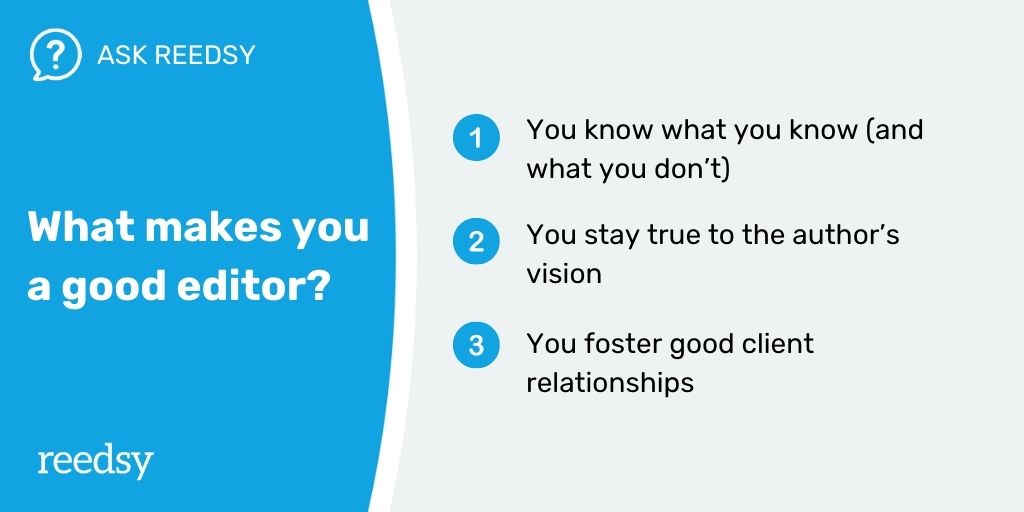
The qualities that make up a good editor will vary depending on your area of editing specialization. For example, while a copy-editor should have an excellent eye for detail, a developmental editor must be able to think about how the plot unravels on a macro level. However, there are a few universal traits you need to lock down before you call yourself a good editor.
1. You know what you know (and what you don’t)
Giving clients clear, confident suggestions will help you to gain their trust and make for a more successful collaboration. And the best way to grow in confidence is to really know your stuff. “Knowledge is power,” Francis Bacon once said, no doubt referring to overtired editors huddled over a laptop at three in the morning.
Define your editing niche
Rather than being a Jack of all trades (and master of none), a good editor is always a specialist. According to Rebecca Heyman — who has edited hundreds of books over her 13-year career — editors should focus on genres they know the most about, ideally those they love to read:
“You’ll feel more confident giving feedback when you can reference popular titles on the market, discuss common tropes, and interrogate the success of the story as an exemplar of that genre.”
If your job is to assess a manuscript’s big picture, writers will rely on you to have a working knowledge of the genre’s elements. You should know what readers expect from structure, characterization, pacing, theme, and conflict — and you should be well-versed in the genre’s most common tropes. We encourage our Reedsy editors to indicate their specific genres of expertise on their profiles for precisely this reason.
Specializing in a few select genres also means listening to that little voice inside your head that tells you when a project isn’t the right fit for you and your editorial skillset — even when the money looks good. As Rebecca tells us, “a good editor knows and respects her limits.”
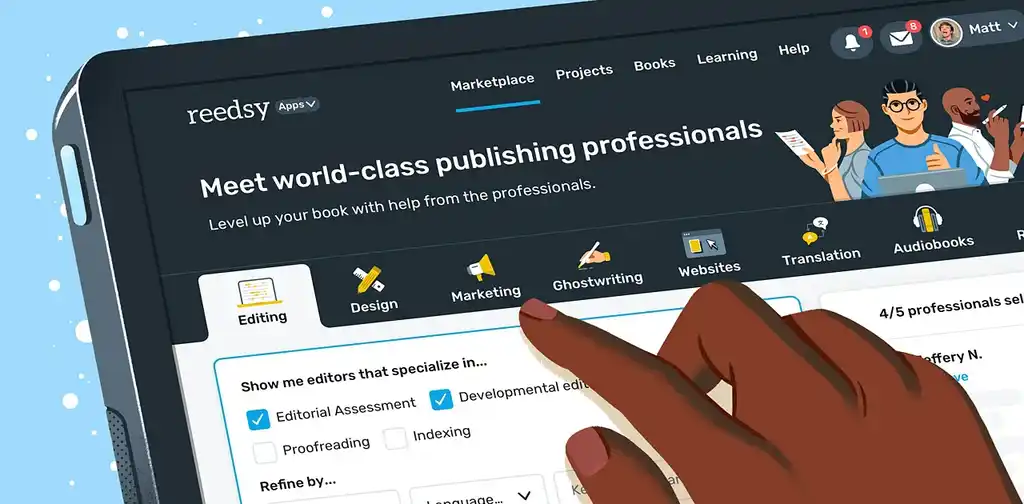
JOIN OUR NETWORK
Supercharge your freelance career
Find projects, set your own rates, and get free resources for growing your business.
Keep a style guide handy
When it comes to line-editing and proofreading, the best of the best will know their given manual of style like the back of their hand. Editor Tracy Gold (who has worked on books published by major imprints) always keeps a physical copy of the style guide she’s using to hand. “A good editor can recognize when they are unsure and knows when they need to stop and look something up.”
The Chicago Manual of Style is one of many books on editing that you should have on hand.
Editors might also want to establish a customized style sheet for every piece that they're editing, where they can keep track of creative decisions, alternative spellings, and anything else they want to be able to reference quickly.
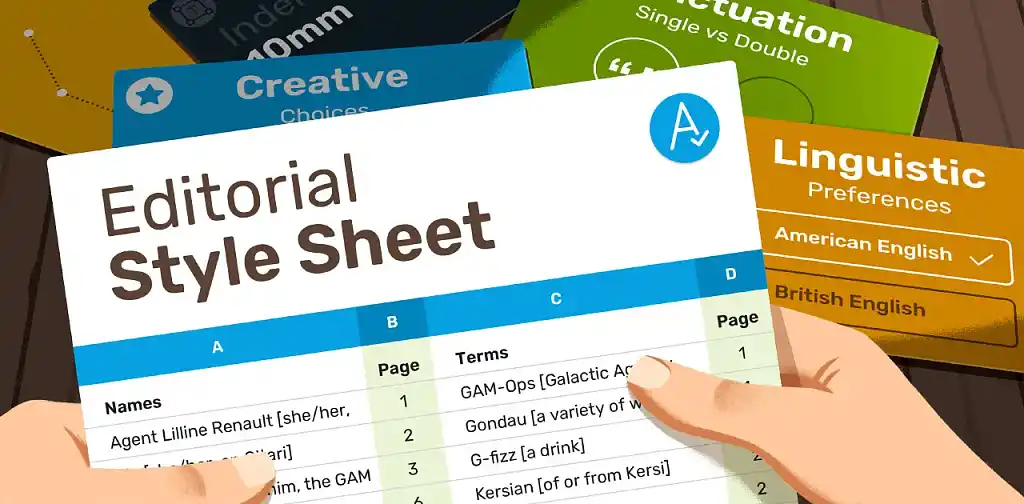
FREE RESOURCE
Editorial Style Sheet Templates
Set up a sleek and easy-to-use style to keep track of all your creative decisions.
2. You stay true to the author’s vision
Though a good editor is knowledgeable enough to advise changes with confidence, they also take care to interrogate their own bias. Tracy stresses the importance of making the book meet the author’s vision, rather than approaching projects with a personal agenda. “That could mean embracing a non-traditional structure, or realizing an author is using sentence fragments on purpose during a copy edit and not trying to ‘fix’ them all. The best editors find a way to help the author improve the work while staying true to the author's vision and style.”
Of course, a good editor never refrains from making suggestions when they think something doesn’t work — but they ensure that their reading is considered and thoughtful. Rebecca encourages editors to consider the role of grammar and mechanics in a manuscript’s overall style: “Though editors aim to provide their clients with the ‘correct answer’, the nature of ‘correctness’ means taking context into account. For example, lax grammar in dialogue is generally accepted as correct, since we are often trying to privilege voice over mechanics.”
Avoid prescriptive editing, or editing on autopilot. Stay attuned to the author’s vision and individual style, and be prepared to adapt as needed.
3. You foster good client relationships
Editor Julie Artz (whose clients have been published by Hachette, Simon & Schuster, and Macmillan) believes that “an editor-client match is a lot like a marriage.” She doesn’t mean that 50% of them end in a shouting match on the street; instead, she stresses the importance of “timely, clear communication and the flexibility to design packages that meet the client’s needs.”
Every day at Reedsy, our support team gets at least three emails from authors, worried that they haven’t heard from their editors in over a day. Are they going to finish my edit in time? Do they hate my third chapter? Is that why they’ve gone silent? In almost all of these cases, the editor has been slammed with other projects or hasn’t checked their email over the weekend. Sometimes, a quick update makes all the difference between a happy client and a panicked one. That said, Rebecca reminds us that “it’s important for editors to set clear expectations and boundaries when a project begins. Whether you plan to provide daily updates or go silent until the work is done, let your authors know what to expect from you.”
Balance honesty with tact
Honesty is always the best policy when it comes to editing: you should never fail to tell a client about a manuscript’s problems because you’re worried about causing offense. As Tracy will attest from her experiences on both sides of the editing process, a good editor explains problems in a way that is both clear and encouraging, providing a combination of practical advice and support. “Being positive, and looking at problems as opportunities to realize a book’s potential, is the best kind of feedback you can give to an author.”
If you’re a developmental editor, you’ll be making suggestions that require a significant amount of work and might feel personal to the author — especially if you’re bold enough to suggest killing a few darlings. Even as a copy editor, you could advise changing sentences the author has pored over. So, to foster a good editor-client relationship, try to be positive and solution-oriented. For example:
🚫 Chapter 1 is all over the place. You’ll have to rewrite most, if not all, of it.
✅ How can we bring more clarity to Chapter 1? Remember, we’re trying to activate character and conflict right away; everything else can wait. Current version of the chapter feels frenetic; consider a rewrite.
Don’t ignore logistics
A good editor starts every potential collaboration by discussing the nuts and bolts of a collaboration. What services are included? Excluded? What are your rates, how much time do you need, and what will you deliver at the end of the collaboration? It’s okay to be firm about the process you think is most effective, but make sure you’re paying close attention to the author’s needs. Considerations must be made for the author’s timeline, budget, and communication style before you commit to a collaboration.
Q: Can you share an example of a challenging project that helped you grow as an editor?
Suggested answer
Great editing often requires balancing the technical with the emotional, especially when an author is overwhelmed by the rewriting process that often follows structural editing. I encountered this dynamic on a manuscript that needed significant reorganization and deeper character development. The author was deeply attached to their work and pushed back on nearly every suggestion, particularly when it came to cutting scenes or developing character motivations. Their hesitation and frustration often stalled progress, making it difficult to maintain momentum.
To navigate this, I focused on framing my feedback as questions rather than directives—inviting the author to reflect on their goals for the story and how certain changes could enhance its impact. For instance, instead of saying, “This subplot is unnecessary,” I’d ask, “How does this subplot connect to the main arc? Do you feel it’s adding depth to the story, or could it be streamlined to strengthen the pacing?” I also celebrated the strengths of their work in every communication, which helped reduce defensiveness and open the door for a more productive dialogue.
The experience reinforced how critical empathy and adaptability are in editing. By acknowledging and addressing the author's concerns and maintaining open communication, we transformed the manuscript into a compelling narrative that stayed true to the author's vision while enhancing its key elements.
Rozi is available to hire on Reedsy ⏺
How to be a better editor
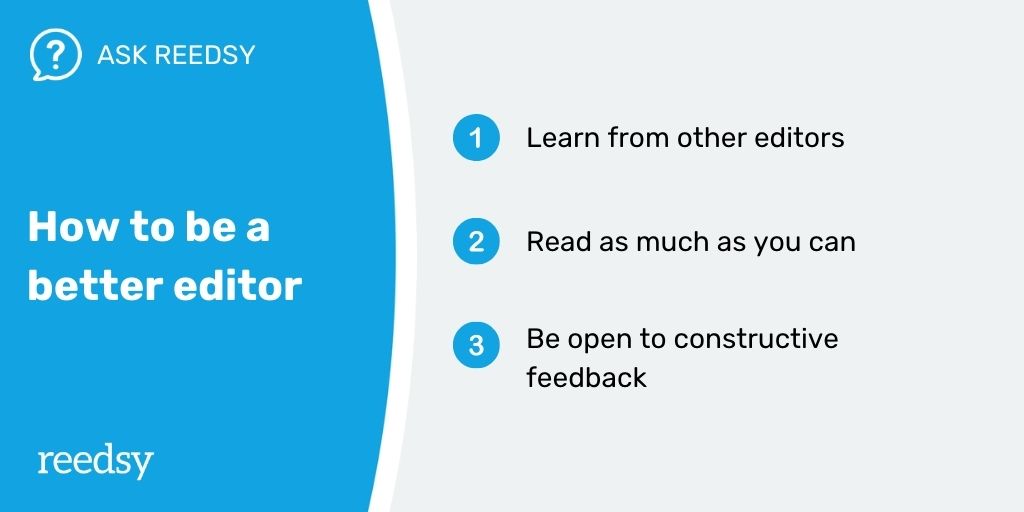
So, now we’re starting to understand some common practices of successful editors. But knowing what a good editor looks like and knowing how to get there are two very different things. After all, watching the NBA finals won’t turn you into LeBron James. Let’s see what our freelancers say you should be doing in practice to become the best editor you can be.
1. Learn from other editors
Like many professions, the big benefit of 'learning on the job' is the ability to watch more experienced editors ply their trade. And there are lots of different ways to go about doing just that.
If you have the option, landing a job as an editorial assistant, agent assistant, or publishing-industry intern is one of the best ways to learn from old hands. Though at first, you may only get paid in MetroCards and free coffee, you’ll be given guidance and a steady stream of work, not to mention the experience you’ll need to eventually strike out on your own. In some cases, you may even be given the chance to read through manuscripts jotted with editorial notes, which will help you to develop an instinct for diagnosing problems and potential.
If you don't have the luxury of working your way up at an agency or publishing house (especially if it means moving to a city where your rent might be the same as your zip code), there are other options. At Reedsy, we host virtual events that feature our editors flexing their editorial skills. Check out our First Line Frenzy or copyediting events to see your peers in action.
Q: What advice have you received that helped you become a better editor?
Suggested answer
The number one advice for me has to be: don't overcomplicate things. As an editor I spend a lot of time simplifying sentences. I can see what the author is trying to get at, but he/she is doing it in a very roundabout way which actually ends up standing in the way of the text and what it's trying to say. The simplest way of saying something is often the best (unless you have a character expressing themselves in a roundabout way on purpose, of course). If as a reader you have to stop and think about what an author means, untangle a sentence, then it needs to be edited. And as an editor, my mindset in those situations is: what is the author trying to say and what is the smoothest way of saying it?
Another good piece of advice for new editors, is: if it ain't broken, don't fix it. When you start out, it's so easy to fiddle with things just because you feel that it's your job to improve absolutely everything. But a good editor can tell when a text flows and doesn't overwork it. Some people unfortunately think of editors as grammar tyrants who nitpick in absurdum, but editing isn't about creating a standardised, bland level of English. A good author can break grammatical rules when it suits him or her and a good editor is able to determine when linguistic inaccuracies benefit the text and when they don't - being able to tell the difference is the hallmark of an accomplished editor.
Last but not least, as an editor you can't have your own style of writing (if you want to write in a way that pleases yours truly first and foremost, you should be a writer, not an editor) - your job is to adapt to the author's way of writing, their diction and rhythm.
Annie is available to hire on Reedsy ⏺
Elsewhere on the internet, editors like Louise Harnby and Carol Saller have blogs (and podcasts!) where they discuss the craft and business of editing. Other editors live on social media, where they talk shop and discuss the latest developments in their industry. The key is to read widely and critically — remember that charlatans are often some of the loudest voices in any field.
2. Read as much as you can

“The best way to be a better editor is to read, read, read,” says Julie Artz. Hopefully, you’ve chosen an editing career because you’re already an avid reader, but that doesn’t mean you can’t improve on your reading habits. Read aggressively within the genres you edit most, and take the time to interrogate what you read. Sharpen your editorial skills by articulating the elements you think are particularly successful, considering what kind of reaction the writing evoked in you — and why.
Rebecca cautions against resting on your laurels when it comes to being well-read. “Fiction, and especially genre fiction, is evolving constantly. What makes for good sci-fi and fantasy today, for example, is much different than what we were seeing in those genres even 10 years ago.” To be an excellent resource for your authors, you have to stay current in your understanding of the market.
Read editorial literature
Occasionally, however, you might swap out your bedtime fiction fix for some industry-related non-fiction. Some editorial literature staples include Elements of Style (4th Ed. by Strunk & White) and Brenda Ueland’s If You Want to Write. You might not want to read them cover to cover, but they're helpful to have on hand when you need to reference something on grammar, style, writing, or narration. You can also read the occasional chapter or two to brush up on your skills.
Keep up to date with editing news
Julie points out that “clients rely on editors not only for comma usage and other Chicago Manual of Style issues, but as industry experts who can guide them toward success with their work.” So, she recommends keeping up-to-date with editing news.
Many editors will bookmark sites like Publishers Marketplace and Publishers Weekly, where they’ll find updates on all the latest deals. While this won’t necessarily help your skillset, you will get a sense of what publishers are looking for right now.
It is perhaps even more important to stay on top of current trends. Literature is often at the forefront of societal change, with topics like the #OwnVoices movement, the American Dirt scandal, and the controversy surrounding J.K. Rowling’s comments on trans rights frequently making headlines. Writers, editors, and publishing professionals alike recognize the importance of the industry’s role in advancing change, and so will often make an effort to stay informed. You can find intelligent discussions in mainstream news sources like The New Yorker, Slate, or The Guardian, so it isn’t hard to keep up to date, and doing so will make a big difference to your growth as an editor.
3. Be open to constructive feedback
You might be thinking, Constructive feedback? Isn’t that my job? It is — but that doesn’t mean you’re immune from professional growth. Alyssa Matesic, an editor who has worked with bestselling authors at Penguin Random House, suggests feedback should be a two-way street.
“Editors, by nature, are excellent at giving constructive feedback — but it's equally important to be open to constructive feedback about your editing. Listen to the writers you're working with. Was one of your recommendations confusing, or did they disagree with a point you raised? Don't write off those moments — log them, and use them as an opportunity to improve your editorial communication skills.”
If you dish it out, you have to be able to take it, as they say. So always try to value the feedback of the writers you’re working with as much as you’d expect them to value yours. At the end of the day, your clients will largely determine whether your career takes off or flounders.
If you can take a few of these steps to become a better editor and keep those important qualities in mind, you should find that the standard of the work you produce just keeps improving. One day, if you keep doing the best work you can do, a project of yours might just end up on the bestseller list!
Q: What advice would you give your younger self at the start of your editing career?
Suggested answer
Top 3:
- Learn to write good contracts. Many clients won't scrutinize the wording of a contract—until they're upset about something, which is the worst time for you to discover you've left a loophole!
- Always be honest with clients. They're paying you to tell them where their book could fail so they can fix it before it goes to market. If you can't do that, they'll rightly be disappointed. But you don't have to be mean about it. Remember that there are often many ways so solve a problem; your ideas aren't always the best ones. Authors are amazing at coming up with creative ways to resolve an issue once they're aware it exists. Don't forget to be honest about things that are working well, too.
- You'll end up working on projects you don't love. That's okay as long as you remember that the book you're working on is special and beloved by someone and it deserves to be treated accordingly. However, there's no reason to ever work with a client who is disrespectful or makes you uncomfortable. Talk with clients before signing a contract. If you're constantly feeling defensive, you won't be able to do your best work.
Sirah is available to hire on Reedsy ⏺
An author is asking for critique, paying for it, but it doesn't mean they can take the critique. You won't know that until they have read through the edit. They won't know this until they read through the edits. They are few and far between but some authors can bite back. That's okay. Accept they weren't in the headspace to accept critique and move on to your next client.
Victoria is available to hire on Reedsy ⏺
Find a company (like Reedsy) so I could edit more fiction.
Jeannine is available to hire on Reedsy ⏺
Keep going and don't give up. Sometimes, with editing's ebb and flow, it can be frustrating to see if you're actually doing this right. I have been freelance editing for years but started taking it seriously in 2021 when I joined Reedsy. I have grown so much and so has my business!
I've loved giving people constructive feedback and praise as part of my process to really bring up morale for the author, as well! It doesn't always have to be negative, it's ok to praise, too!
Stephanie is available to hire on Reedsy ⏺
Trust your taste and your instincts, but also be deliberate about honing your skills. Seek out mentors for advice and examples. Editing is something that can be learned, but the most important way to do that is by practice and experience.
Margot is available to hire on Reedsy ⏺
I’ve been editing for more than 25 years, so I would have a lot to say. But mostly I would tell myself to educate myself as much as possible — take classes, seminars, get certificates — learn as much as I can so that I am as good as I can possibly be at what I do. I would tell myself to follow my instincts because they will usually serve me right. I got into editing for a reason, and I will still love it 25 years down the line.
And I would tell myself that someday, when I have put in my time at the big publishing companies, freelancing will be the perfect thing for me. That I will be happy.
Jenny is available to hire on Reedsy ⏺
That you know more than you think you do. But other editors' advice is worth its weight in gold.
Lauren is available to hire on Reedsy ⏺
I accept that this isn't quite answering the question, but I would have told my younger self that this is something that you can do as a career! When I was younger and not sure what I wanted to do for a job, it never occurred to me that there was an editing stage – let alone several different editing stages – between writing a novel and it arriving in book form for me to read. It took reading about it in a novel – 'The Cottage at Hope Cove' by Hannah Ellis, in case you're wondering – when I was already over 20 years into my career as a lawyer, to see what I could have been doing all that time.
So I guess, to actually answer the question, my advice would be that it's never too late to start and that, while you may never get to write that novel you think you have inside you, you do have a valuable contribution to make to those who possess that creativity.
Helen is available to hire on Reedsy ⏺
Special thanks to Rebecca Heyman for her judicious edits on this article.

